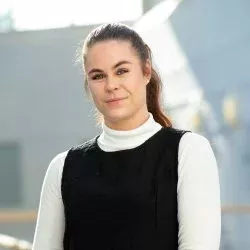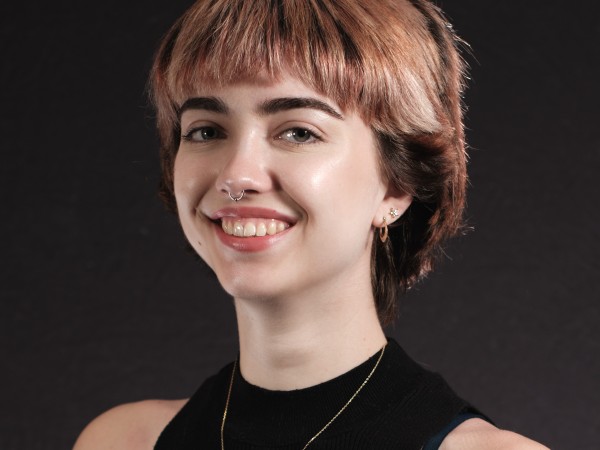
Hannah Gooding
"All these extra-curricular developments show that if you work hard, Surrey will support you into becoming the person you want to be."
Course
Management and Business PhDEntry year
2021"I love the sense of community that working on a PhD brings; I love the intellect, the conversation, and being surrounded by brilliant minds as your thinking is constantly being pushed."
Why did you choose to come to Surrey?
I have been at Surrey since 2015 and it’s like a home to me. The campus provides a 24-hour library, spaces like the Hive provide a space for teams to work together, the Centre for Wellbeing takes mental health seriously if you need support. There’s an on-campus shop, a gym, all the departments/lecture halls are in the same place. It’s a mini-village basically!
What was your impression of Surrey?
I remember when I was visiting campuses on open days in 2014. The second I came to Surrey I instantly felt a connection; it actually motivated me to get triple A* in my college studies as I wanted to get the Chancellor’s Scholarship to Surrey (which I ended up winning, hurray!). Now every time I come onto campus to go to my research office and I walk past the place where I first sat down in 2014, just in the lobby area before the Lakeside Coffee Shop, I smile to myself.
What course(s) did you study before undertaking your PhD, and where did you study?
My first degree was in International Hospitality and Tourism Management and I followed it with a masters in Sustainable Development – both at Surrey.
Why did you choose to study your PhD?
During my MSc I expected to learn that there was a shortage of solutions to the environmental and social problems modern-day society and the planet is currently facing. Actually, what I learned is that we do have solutions: we have carbon capture storage technologies, ecological economics, circular growth concepts, and energy conversion systems. The problem is that we are not taking a systems-approach, meaning that all these solutions are operating in insolation instead of being connected.
Why did you choose to study it at Surrey?
"Surrey, over the years, has contributed to my personal development as an individual."
Surrey, over the years, has contributed to my personal development as an individual. Outside of my degrees, I
- arrived on a Chancellor’s Scholarship in 2015
- completed the Global Graduate Award in Sustainability in 2017
- received funding to attend the summer school at La Rochelle Business school in 2018
- was shortlisted for the best paper for the international business strategy module
- was invited onto Surrey’s Top Achievers Recognised [STARS] and Support Programmes 2018-2019
- attended a masterclass on e-tourism at the University of Modul in Vienna in 2019, and
- was successfully awarded PhD funding from the Doctoral College on the project-led studentship award in 2021.
All of these extra-curricular developments show that if you work hard, Surrey will support you into becoming the person you want to be.
Why are you passionate about your subject?
Regarding transdisciplinary working, if human understanding, social and collaborative capabilities are harnessed in the right way, a better future for business, planet and people can be created.
Which facilities or other resources have you used during your PhD?
The Centre for Wellbeing is amazing and I have had mentoring for the past couple of years which has helped me immensely to develop my sense of self but also to rationalise with the common stresses of doing a PhD.
How has your supervisor helped you to achieve your aims during your PhD studies?
"Doing a PhD is tough, so having supervisors who are serious about investing time to build up the academic community rather than just trying to get you to passing for the sake of passing, makes the world of difference."
Without a doubt, Professor Glenn Parry is a great example of leadership: he invests energy and effort not only scientifically into my work but professionally to develop me into an early career researcher. Doing a PhD is tough, so having supervisors who are serious about investing time to build up the academic community rather than just trying to get you to passing for the sake of passing, makes the world of difference.
How much opportunity has there been for collaboration during your PhD, either with researchers and academics at Surrey or with external organisations or companies?
I work for the research group Transdisciplinary Engineering Research Design (TREND), a collaboration between Bath, Bristol and Surrey Universities to examine transdisciplinarity in the engineering context. I am currently working with an international research division and published two papers with the group, one at Massachusetts Institute of Technology (MIT) earlier this year in June.
How have you found your overall experience of studying for a PhD at Surrey?
Honestly, to be candid, I love the sense of community that working on a PhD brings; I love the intellect, the conversation, and being surrounded by brilliant minds as your thinking is constantly being pushed.
On the other side, of course, doing a PhD is tough which is why not everybody does one. It is a lonely process, it is long hours, and the publish-or-perish culture weighs heavily on PhD candidate's shoulders.
What has been your best moment at Surrey so far?
Going on a research trip during my BSc to Morocco – my friends and I still talk about it years later, working with staff from the University on tourism projects for the EU and UN, meeting my best friend during the beginning of my PhD who works in my department – it’s great to share this experience with someone who understands you. The list goes on!
Do you have any advice for students thinking about postgraduate study?
"Don’t just think about it, do it! Dream big, work hard, show up and produce good research: see where your future leads you."
Don’t just think about it, do it! Dream big, work hard, show up and produce good research: see where your future leads you.
It will be tough, so make sure your health becomes your number one priority so you can succeed in the doctoral degree. Eat well, drink water, get enough sleep, exercise, take time off when it is needed, be able to balance, set goals, and project plans, be organised and get a good professional and personal support system behind you.
What do you plan to do following your PhD course at Surrey?
I hope (one can dream) research fellowship/associate, post doc or, if that’s not an option, then lecturer. If there’s space for me at Surrey to be a full-time member of staff then happy days and dream come true.
Finally, do you have any other comments you’d like to offer about your time at Surrey?
I remember working on a hotel graduate management programme after being too scared to do a doctorate. Whilst working behind the reception desk I was checking-in a woman with ‘Dr’ in front of her name. After a conversation with this doctor and many more months of watching groups of professors and researchers from behind a hotel reception desk, I still felt the pull back to Surrey; I decided to face my fears and take the challenge on. I quit the programme and came back to Surrey: it was the best decision I ever made in my life.
Discover more about our PhD programmes here.
